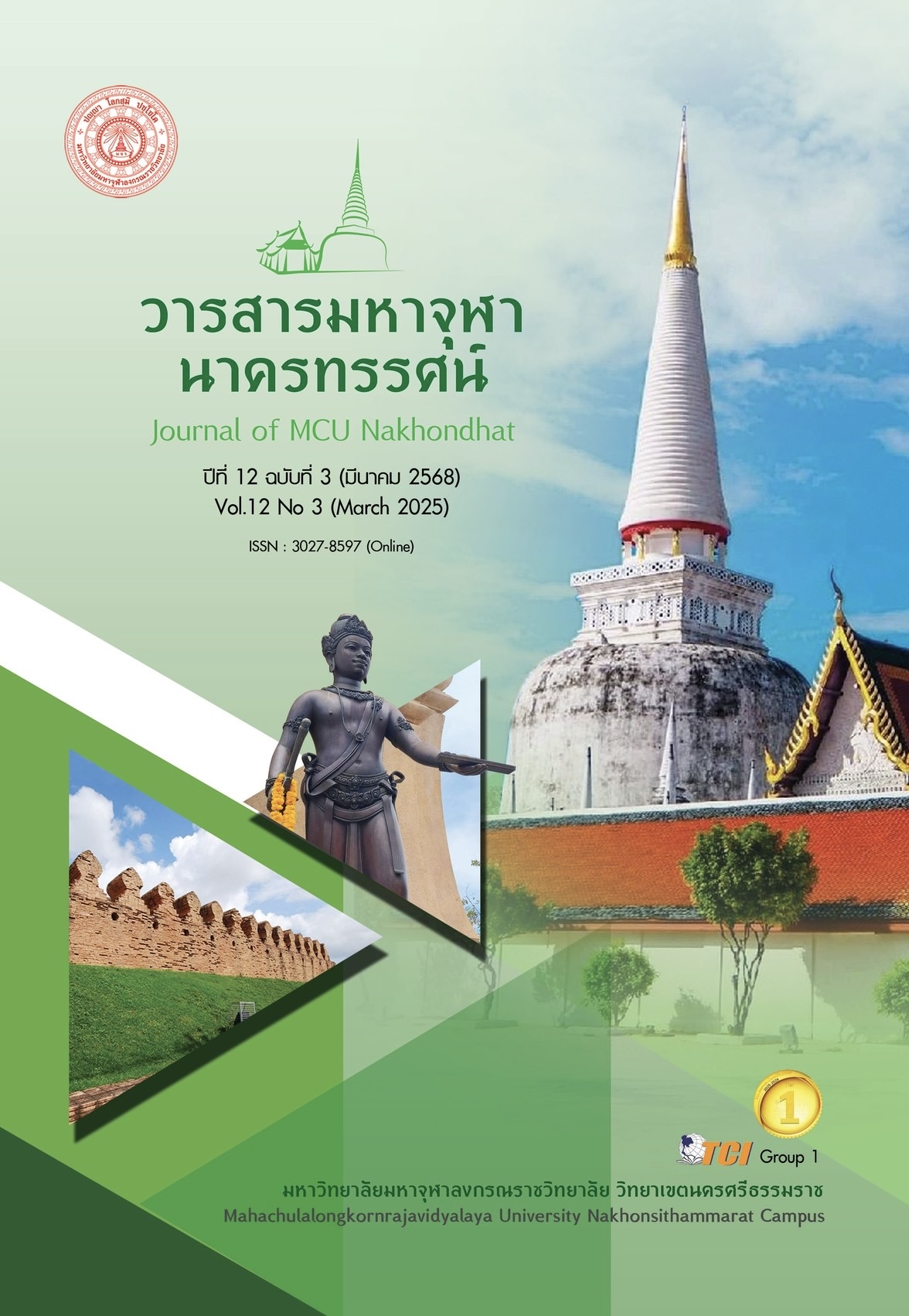A NEEDS ASSESSMENT FOR THE LEADERSHIP DEVELOPMENT OF UNIVERSITY STUDENTS IN SONGKHLA PROVINCE
Main Article Content
Abstract
This research article aims to assess the needs for leadership development among university students in Songkhla Province. This is a quantitative study employing a survey research design. The population consists of university students who hold leadership positions at various levels, including faculty/college representatives, club leaders, student councils, student government organizations, and student unions in five universities in Songkhla Province. These universities include Thaksin University (Songkhla Campus), Songkhla Rajabhat University (Songkhla Campus), Rajamangala University of Technology Srivijaya (Songkhla Campus), Prince of Songkla University (Hat Yai Campus), and Hatyai University during the second semester of the 2024 academic year. The sample group consists of student leaders from Hatyai University, selected using cluster sampling through a lottery method. The research instrument is a questionnaire designed to assess the needs for leadership development across five dimensions, comprising 23 items. Content validity was examined using the item-objective congruence (IOC) index, which ranged from 0.67 to 1.00, while reliability was measured, yielding a Cronbach's alpha coefficient of 0.85. Data were collected using a questionnaire, and the statistical methods used for data analysis included percentage calculations and the analysis of needs using the Pair Response Method (PNImodified). The research findings revealed that the sample group had the highest need for the development of leadership skills in the following areas: teamwork skills, with a PNImodified value of 0.75; followed by leadership skills, with a PNImodified value of 0.74; and interpersonal skills, with a PNImodified value of 0.70. Planning skills were ranked next, with a PNImodified value of 0.62. The lowest need was found in communication skills, with a PNImodified value of 0.58.
Article Details

This work is licensed under a Creative Commons Attribution-NonCommercial-NoDerivatives 4.0 International License.
References
กชวรรณ บุตรกริม และคณะ. (2563). ทักษะจำเป็นในการบริหารงานของคณะกรรมการบริหารองค์การนักศึกษา มหาวิทยาลัยสงขลานครินทร์ วิทยาเขตตรัง. เรียกใช้เมื่อ 25 ธันวาคม 2567 จาก https://so03.tci-thaijo.org/index.php/husoskru/article/view/243731
จักรกฤษณ์ สิริริน. (2563). ชวนทำวิจัย “ความต้องการจำเป็น” ด้วยสถิติ PNI ไม่ยากอย่างที่คิด คุณก็ทำได้. เรียกใช้เมื่อ 25 ธันวาคม 2567 จาก https://www.salika.co/2020/08/16/priority-needs-index-part-2/
ณัฏฐภรณ์ หลาวทอง. (2559). การสร้างเครื่องมือการวิจัยทางการศึกษา. กรุงเทพมหานคร: สำนักพิมพ์แห่งจุฬาลงกรณ์มหาวิทยาลัย.
พล เหลืองรังษี และชัดชม รัศมีมณฑล. (2566). การศึกษาผลลัพธ์การเรียนรู้ที่คาดหวังและความต้องการจําเป็นในรายวิชาการวิจัยเพื่อพัฒนาการเรียนรู้ของนักศึกษาวิชาชีพครู. วารสารสังคมศาสตร์และวัฒนธรรม, 7(7), 246-256.
พิมพ์ชนก สีหา และสุภาวดี บาลี. (2564). แนวคิดและทฤษฎีที่เกี่ยวข้องกับการสำรวจความต้องการและความคาดหวัง. เรียกใช้เมื่อ 25 ธันวาคม 2567 จาก https://dusitpoll.dusit.ac.th/KB/2021/594/
ภูริส ภูมิประเทศ และตรีชฎา สุขเกษม. (2562). ภาวะผู้นำของผู้นำนักศึกษามหาวิทยาลัยราชภัฏสุรินทร์. มนุษยสังคมสาร, 17(2), 121-139.
สัมมนา สีหมุ่ย. (2553). การศึกษาประสิทธิภาพการทำงานเป็นทีมของบุคลากรองค์การบริหารส่วนตำบลในเขตอำเภอโนนไทย จังหวัดนครราชสีมา. เรียกใช้เมื่อ 21 ธันวาคม 2567 จาก http://sutir.sut.ac.th:8080/sutir/bitstream/123456789/5070/1/Fulltext.pdf
สำนักพัฒนานักศึกษาและส่งเสริมศิลปวัฒนธรรม มหาวิทยาลัยหาดใหญ่. (2567). คำสั่งมหาวิทยาลัยหาดใหญ่ เรื่อง การแต่่งตั้งคณะกรรมการสโมสรนักศึกษา คณะกรรมการนักศึกษาประจำคณะ และคณะกรรมการชมรมนักศึกษา ประจำปีการศึกษา 2567. เรียกใช้เมื่อ 25 ธันวาคม 2567 จาก https://sdc.hu.ac.th/download/announce
อาฟีฟี ลาเต๊ะ. (2566). การวิจัยในชั้นเรียน (Classroom Research). (พิมพ์ครั้งที่ 4). กรุงเทพมหานคร: สำนักพิมพ์ ไอ.เจ.สยาม.
World Economic Forum. (2016). New vision for education: Unlocking the potential of technology. Retrieved December 25, 2024, from https://www3.weforum.org/docs/WEF_New_Vision_for_Education.pdf


